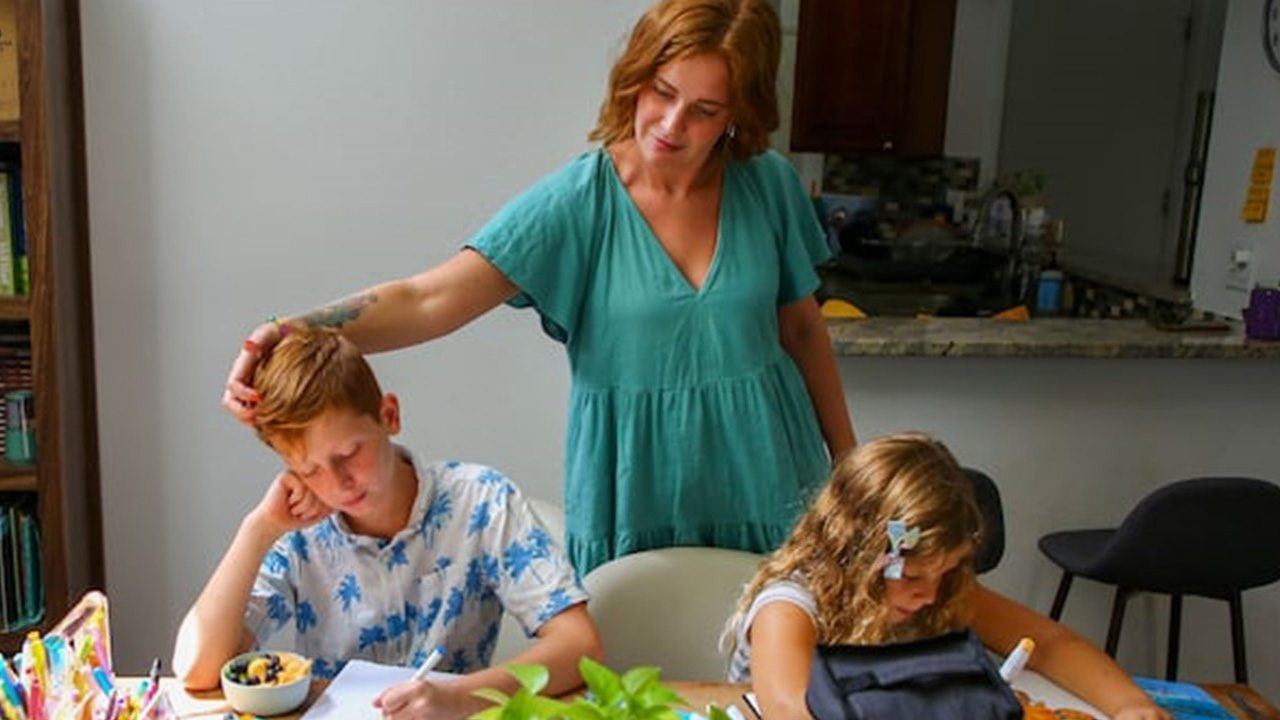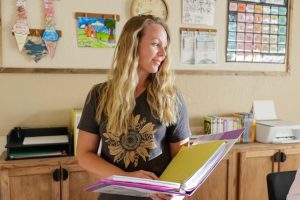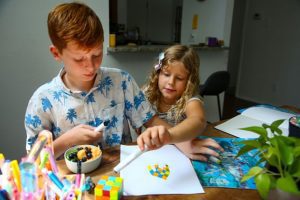
Homeschooling is booming in Florida. We asked three families why.
Tampa Bay Times | By Ian Hodgson | August 8, 2024
Some 20,000 students in Tampa Bay are learning at home as parents look for more time with and security for their kids.
Cherise Schurdell didn’t know anyone who homeschooled when she pulled her three youngest children from public school in 2004.
Schurdell went to her library outside New Port Richey for resources, taking out books “basically like homeschooling for dummies,” she said. The only support organization in her community — the Pasco Christian Homeschool Association — had a handful of members, she said.
Two decades later, Schurdell and her daughter-in-law were among a sea of nearly a thousand parents at the Tampa Bay Homeschool Conference last month in Trinity.
“The options out there are endless,” said Schurdell, 58. “It went from nothing to overwhelming.”
In the 20 years since Schurdell broke from Florida’s public education system, the number of homeschooled students in the state tripled, according to Johns Hopkins University’s Institute for Education Policy.
From 2017 to 2022, Florida’s homeschool population grew nearly 70 times faster than the state’s public school enrollment and was among the highest rates in the nation, according to a Washington Post analysis.
Tampa Bay is now a haven for homeschoolers. Nearly 11,000 homeschool students live in Hillsborough alone — more than any other school district in Florida. About another 9,000 live in Pasco and Pinellas, according to the most recent numbers from school districts.
To understand what’s behind the explosive growth, the Tampa Bay Times spoke with two dozen families from across the region who have chosen to teach their kids at home.
Each family described different factors drawing them toward homeschooling and away from public schools.
Here’s how three Tampa Bay families described their decision — and how experts say they fit in with broader trends.
“Preserve some of their innocence”
Schurdell started homeschooling when her school stopped allowing her to volunteer in her son’s class. If she couldn’t be in the classroom, the classroom would come home to her.
Now, her daughter-in-law, Victoria Schurdell, homeschools her three children — Ronnie, 9, Riley, 6, and TJ, 3 — for much the same reason.
“We’re incredibly privileged that I’m able to stay at home,” said Victoria Schurdell, who is starting her fifth year of homeschooling.
Her husband earns enough as a diesel mechanic to support the family on a single income. Plus, she has plenty of help nearby. Her mother lives in the same gated community outside New Port Richey. Her mother-in-law, Cherise, lives just 20 minutes down the road.

Victoria Schurdell is seen in the classroom area of her home, where she homeschools her three children, on July 31 in New Port Richey. [ LUIS SANTANA | Times ]
In many ways, they’re typical homeschool parents, according to prepandemic U.S. Department of Education data. White families were more than twice as likely to homeschool as Black or Hispanic families. Rural and upper-middle-class families were also more likely to homeschool than their peers.
Between 2003 and 2019, homeschooling grew the fastest among rural, white families like the Schurdells, according to federal survey data.
In most homeschool families, at least one parent has some college education. Victoria Schurdell went to college, studying education, though she never completed her degree. She spent two years interning and substitute teaching in Pasco County schools.
Family time was the driving reason to stay home with her children, but she also had concerns about public schools.
“Some of the stuff you see makes you uneasy,” she said. One third grade boy showed her a shiv he’d carved from a piece of wood. Another time, she overheard a group of 12-year-old girls discussing intimate details of their sex lives.
“I’m not some crazy, overprotective mom, and I’m not trying to shelter them,” Schurdell said of her children. “I just want to make sure they can preserve some of their innocence while they’re still young.”
The dining room became the classroom. Bookshelves and drawings line the walls. Meticulously organized binders packed with worksheets and writing assignments sit on a shelf — proof the children are making progress in case the district requests it.
On a recent afternoon, a deer wandered into the yard outside the bay windows. The kids bolted from watching “Jurassic Park” in the living room to catch a glimpse.
“That’s not something you’d see at a regular school,” Cherise Schurdell said.
“God was guiding us”
Dina Smith was homeschooled with her three siblings outside Omaha, Nebraska. She was certain she didn’t want the same for her children. But when the family moved to Palm Harbor after the COVID-19 pandemic, she noticed a change in her 11-year-old son, Brayden.
“He came home angry every day,” she said. His schoolmates were cliquish, unwelcoming to her son. He felt bullied by teachers for his slow reading.
Smith and her husband, Phil, prayed for answers.
“It took a while for me to hear the answer he was giving us,” Smith said. “But God was guiding us toward homeschool.”
Faith informs every part of the Smiths’ day-to-day lives. It also stirred tension with the public school curriculum.
“God created us as men and women,” said Phil, a graphic designer who works from home. “I don’t want them to be in an environment where they’re being told something different.”
Dina, a trained chef, handles most of the homeschooling for Brayden and his sister Isla, 6.

Brayden Smith and his sister Isla work on art while being homeschooled on Aug. 2 at their home in Palm Harbor. [ DOUGLAS R. CLIFFORD | Times ]
When homeschooling was legalized in Florida in 1985, the majority of families were conservative and Christian, said Kim Hannon, president of the Tampa Bay Homeschooling Conference.
By 2007, more than a third of homeschooling parents said religious or moral instruction was their primary reason for choosing the option — the most common answer given, according to the National Center for Education Statistics.
Home education has strong ties to Tampa Bay’s Christian community. The majority of programs offered to homeschool families at July’s conference have some religious affiliation, according to their websites.
This fall, Brayden will join Classical Conversations, a Christian cooperative that meets once a week to cover math, history and Latin. It’s among the largest options of faith-based curriculum and tutoring.
In 2019, more than 80% of homeschool parents said religious and moral instruction were among the reasons they homeschooled. But when asked for their primary motivation, just 1 in 5 selected religion or morality.
Over the past decade, parents have grown more concerned with academics and safety in public schools. Nationally, 2 out of 5 parents cited those reasons as their primary concern in 2019, the latest available year for federal survey data.
“A lot of it is reactionary, and even more so since COVID,” Hannon said.
The pandemic got parents used to teaching kids in their home and gave them insight into exactly what their children were learning. Those with strong Christian or traditional viewpoints did not like what they saw, she said.
“A lot of parents will say to me: ‘I don’t really want to homeschool, but I don’t know what else to do because I don’t trust the government,’” Hannon said.
“Knowing right from wrong”
In Dade City, Gino and Sadie Collura are still a year from having to decide what to do with their 3-year-old daughter, Serafina, and later their 1-year-old, Giavanna. They view public schools as a minefield, from the emotional harms of peer pressure to the threat of an active shooter.
“If someone has a gun, we’ve all seen how much damage someone can do before they’re stopped,” said Gino, who worked in both private security and as a public school teacher.
“There are videos of the fights,” Collura said. “Even the girls, just beating on each other. When you have hundreds of kids and one (school resource officer), how are they going to stop stuff like this?”
Later that evening, Gino texted an Instagram video from the Hillsborough County Sheriff’s Office. It showed children making online death threats — “a good supporting snippet of what we discussed,” he wrote.

Sadie Collura, left, and her husband, Gino, work on a reading lesson with their daughter Serafina on Aug. 2. [ IAN HODGSON | Times ]
“We have truly done our due diligence to give American society a good productive citizen,” Collura said. “That means knowing right from wrong, having that moral foundation.”
It’s confusing for students to hear one message at school and another at home, Collura said. There’s no bigger divide than issues of sexuality and gender, he said, citing bathroom access based on gender identity as one example.
“That’s just not something we’re interested in,” Collura said.
Pasco County public schools require students to use the bathroom or locker room that aligns with the sex on their birth certificate. However, updated federal rules banning discrimination by gender identity could reverse that policy. The changes to Title IX regulations were halted by a federal appeals court in July.
Jessica Chapman, a former public school teacher who now tutors homeschooled children, said the majority of families she meets worry about ceding control of their children’s values. These families have political, cultural or religious ideologies that clash with the mainstream — or their understanding of it.
“Their kid comes home spouting off about globalization or socialism, and suddenly they feel like they became the villain,” Chapman said. “They’re tired of unwiring and rewiring their kids’ brains after they come home from school.”
Growing public perception of the leftward tilt of public education is pushing more families to reconsider whether their values align with the institution, Chapman said.
“Someone is forcing values on the child,” she said. “Should that be the parent or the school system?”





